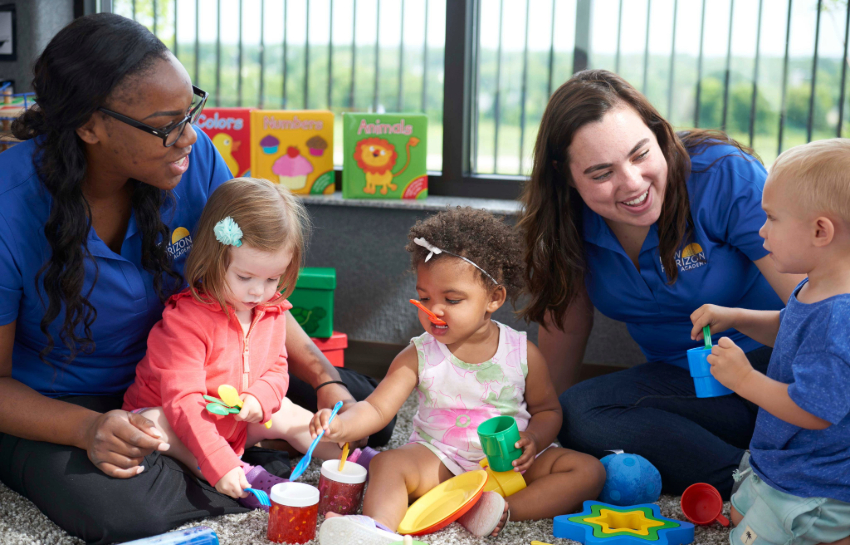The Duty of Childcare in Cultivating Your Kid's Psychological and Cognitive Abilities With Structured Play and
The duty of childcare in nurturing a kid's cognitive and emotional growth is commonly undervalued, yet it works as a pivotal environment for organized play and academic activities. Via carefully made communications and experiences, caregivers facilitate necessary abilities such as emotional recognition and analytical. These foundational components not just enhance a youngster's capacity to get in touch with peers but likewise foster durability and adaptability in various circumstances. Comprehending the subtleties of just how these dynamics unfold increases crucial inquiries about the long-term impact of early day care experiences on individual development and social integration. What might that mean for future development?
Significance of Structured Play
Structured play is a vital part of young child advancement, as it provides a structure where youngsters can take part in meaningful interactions and finding out experiences. This sort of play is intentionally made to cultivate different developmental abilities, such as cognitive, social, and physical capabilities. By taking part in organized tasks, young children discover to adhere to rules, take turns, and accept peers, all of which are vital for their social skills.

In addition, structured play commonly integrates educational components, such as counting, shade recognition, and language development, perfectly integrating learning into enjoyable activities. This approach not just captures toddlers' focus however additionally strengthens vital ideas in a satisfying way. Overall, structured play contributes in advertising a well balanced advancement, gearing up toddlers with the foundational skills essential for future knowing and social communications.
Emotional Development in Day Care
Day care atmospheres play a critical duty in cultivating psychological advancement in young children. These setups give youngsters with possibilities to connect with peers and caretakers, assisting in the growth of essential social-emotional abilities. Via routine interactions, toddlers find out to acknowledge and express their feelings, such as happiness, irritation, or unhappiness, which is important for their emotional maturation.

In addition, the organized atmosphere of daycare permits kids to experience a variety of feelings in a risk-free space. When transitioning from home to childcare and establish durability as they navigate brand-new relationships and experiences, they find out to handle sensations of separation stress and anxiety. Overall, the emotional development cultivated in day care not only advantages young children throughout their formative years yet likewise prepares for healthy and balanced interpersonal partnerships and emotional wellness throughout their lives.
Cognitive Skills With Tasks
With participating in a range of activities, kids in childcare settings can dramatically enhance their cognitive abilities. Structured play and academic jobs are vital in advertising cognitive growth, as they provide Check Out Your URL opportunities for expedition, analytic, and crucial reasoning. Tasks such as puzzles, foundation, and memory games challenge kids to think creatively and practically, cultivating important abilities like spatial awareness and pattern recognition.
Moreover, interactive storytime sessions motivate language advancement and understanding. By paying attention to stories, toddlers learn to process info and involve their creative imaginations, which boosts their narrative skills and vocabulary. In addition, hands-on tasks entailing crafts and arts promote fine motor abilities while additionally motivating self-expression and imagination.
Sensory play, such as sand or water activities, allows kids to trying out various structures and materials, advertising inquiry-based understanding. These experiences not just enhance cognitive abilities yet likewise instill a sense of inquisitiveness concerning the world around them - baby daycare near me. Overall, the varied variety of cognitive activities provided in childcare atmospheres plays a pivotal duty fit a toddler's capacity to think seriously, resolve problems, and involve meaningfully with their surroundings
Social Connections and Communication
In a nurturing setting, young children naturally build social connections and participate in communications that are important for their psychological and social advancement. Daycare setups offer an one-of-a-kind possibility for kids to connect with peers, cultivating vital social skills such as sharing, teamwork, and problem resolution. These interactions aid toddlers find out to navigate their feelings and understand the point of views of others, which are vital parts of emotional knowledge.
Through structured play and group activities, kids are motivated to communicate their sensations and thoughts, improving their spoken skills and promoting compassion. Engaging with peers likewise presents them to diverse social standards and actions, enhancing their understanding of social dynamics. Moreover, consistent communication with other children assists to construct a sense of neighborhood, supplying a support group that is helpful for emotional development.
As toddlers participate in collective tasks, they discover the value of synergy, arrangement, and perseverance. These foundational social abilities are essential as they get ready for future partnerships, both in instructional settings and beyond. Ultimately, the social links created in childcare play a substantial duty in forming a young child's capability to engage favorably and properly with others throughout their lives.
Duty of Caretakers in Growth

Caretakers play a crucial duty in cultivating kid advancement, specifically in the context of the social communications they experience Homepage in day care setups. These experts give a caring setting where toddlers can discover their feelings and cognitive capabilities through structured play and . By participating in purposeful discussions, caregivers support language development and enhance social skills.
Moreover, caregivers model psychological responses and ideal habits, helping kids discover empathy and dispute resolution. Their presence additionally creates a feeling of protection, which is necessary for children to with confidence explore their surroundings and involve with peers.
In addition to emotional and social assistance, caretakers contribute in implementing instructional curricula that advertise cognitive development - daycare near me for infants. They introduce his comment is here age-appropriate tasks that stimulate curiosity, crucial thinking, and analytical abilities. This structured method makes sure that toddlers not only enjoy their playtime yet also acquire fundamental expertise vital for future understanding
Ultimately, the top quality of caregiver interactions substantially influences a kid's overall development. By promoting a helpful and interesting ambience, caregivers help lay the groundwork for healthy emotional and cognitive growth, gearing up kids with vital abilities for their lifelong journey.
Final Thought
In final thought, childcare works as a vital environment for fostering emotional and cognitive growth in kids. Via structured play and , kids experience considerable growth in their capability to acknowledge and reveal emotions, develop crucial believing abilities, and type vital social links. The function of caregivers is critical in promoting these experiences, ensuring that each child take advantage of a nurturing atmosphere that promotes lifelong emotional well-being and cognitive development.
The function of day care in nurturing a toddler's emotional and cognitive advancement is commonly underestimated, yet it serves as a critical atmosphere for structured play and educational tasks. Generally, structured play is critical in promoting a well balanced growth, outfitting kids with the fundamental skills necessary for future learning and social interactions.
Daycare settings play a crucial function in fostering psychological advancement in toddlers. Generally, the emotional advancement fostered in day care not only advantages toddlers throughout their formative years yet also lays the foundation for healthy and balanced social relationships and psychological health throughout their lives.
Through structured play and group activities, young children are encouraged to connect their ideas and sensations, enhancing their verbal abilities and promoting compassion.